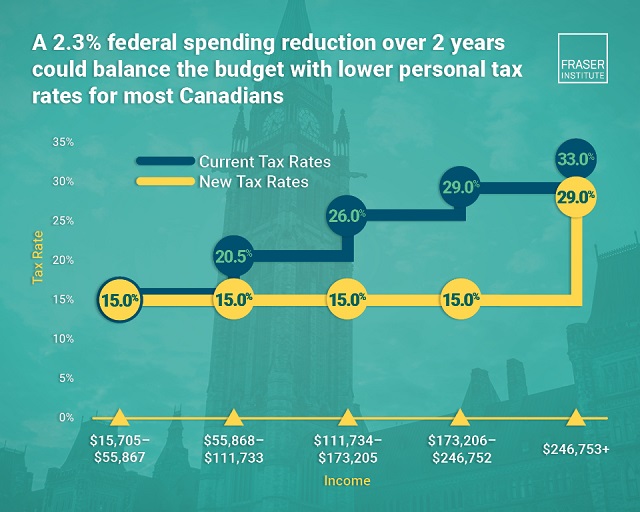Economy
Federal government could balance budget and reduce tax rates with 2.3% spending reduction over two years

From the Fraser Institute
By Jake Fuss and Grady Munro
If the federal government reduced program spending by only 2.3 per cent over two years and eliminated a host of tax expenditures, it could balance the budget and reduce personal income tax rates affecting most Canadians, finds a new
study published today by the Fraser Institute, an independent, non-partisan Canadian public policy think-tank.
“With modest spending reductions and tax reform, the federal government can create the fiscal room to provide tax rate reductions that would benefit most Canadians,” said Jake Fuss, director of fiscal studies at the Fraser Institute and co-author of A New Federal Fiscal Framework for Canada.
Specifically, if the government implemented this spending reduction—and eliminated 49 federal personal income tax expenditures (tax credits, tax exemptions, etc.), which do little to improve economic growth yet reduce government revenue—it could eliminate the three middle federal personal income tax rates (20.5 per cent, 26.0 per cent, 29.0 per cent) and reduce the top rate from 33.0 per cent to its previous level of 29.0 per cent.
As a result, with only two remaining rates, nearly all Canadians would pay a marginal personal income tax rate of 15 per cent. And the federal government could balance the budget by 2026/27.
“In light of Canada’s dim economic prospects and lack of tax competitiveness, the federal government should move away from the status quo and pursue a pro-growth fiscal strategy,” Fuss said.
“At a time when affordability is top of mind, it’s time for Ottawa to reduce tax rates and restore discipline to federal finances.”
- Poor government policy has led to a significant deterioration in Canada’s federal finances over the last decade. The introduction of new and expanded government programs has caused federal spending to increase substantially, resulting in persistent deficits and rising debt.
- Canada also maintains markedly uncompetitive personal income taxes relative to many other advanced economy jurisdictions. This hinders Canada’s ability to attract and retain highly skilled workers, entrepreneurs, and business owners.
- Canada must make meaningful policy reforms by pursuing reductions in both federal spending and tax rates to address the current fiscal and economic challenges.
- The federal government should eliminate 49 federal PIT tax expenditures and remove the three middle income tax rates of 20.5, 26.0, and 29.0 percent while reducing the top marginal PIT rate from 33.0 to 29.0 percent.
- The federal government can introduce a comprehensive tax reform package and achieve a balanced budget by 2026/27 through reducing nominal annual program spending by 2.3 percent over a two-year period.
- Returning to balanced budgets should be viewed as a starting point rather than the end goal.
- Imposing a Tax and Expenditure Limitation (TEL) rule that caps growth in program spending at the rate of inflation plus population growth would be the next step for federal finances over the long-term.
- This would allow for budget surpluses in subsequent years after achieving the initial balanced budget and ensure discipline in government spending for the foreseeable future.
Authors:
Business
Socialism vs. Capitalism

People criticize capitalism. A recent Axios-Generation poll says, “College students prefer socialism to capitalism.”
Why?
Because they believe absurd myths. Like the claim that the Soviet Union “wasn’t real socialism.”
Socialism guru Noam Chomsky tells students that. He says the Soviet Union “was about as remote from socialism as you could imagine.”
Give me a break.
The Soviets made private business illegal.
If that’s not socialism, I’m not sure what is.
“Socialism means abolishing private property and … replacing it with some form of collective ownership,” explains economist Ben Powell. “The Soviet Union had an abundance of that.”
Socialism always fails. Look at Venezuela, the richest country in Latin America about 40 years ago. Now people there face food shortages, poverty, misery and election outcomes the regime ignores.
But Al Jazeera claims Venezuela’s failure has “little to do with socialism, and a lot to do with poor governance … economic policies have failed to adjust to reality.”
“That’s the nature of socialism!” exclaims Powell. “Economic policies fail to adjust to reality. Economic reality evolves every day. Millions of decentralized entrepreneurs and consumers make fine tuning adjustments.”
Political leaders can’t keep up with that.
Still, pundits and politicians tell people, socialism does work — in Scandinavia.
“Mad Money’s Jim Cramer calls Norway “as socialist as they come!”
This too is nonsense.
“Sweden isn’t socialist,” says Powell. “Volvo is a private company. Restaurants, hotels, they’re privately owned.”
Norway, Denmark and Sweden are all free market economies.
Denmark’s former prime minister was so annoyed with economically ignorant Americans like Bernie Sanders calling Scandanavia “socialist,” he came to America to tell Harvard students that his country “is far from a socialist planned economy. Denmark is a market economy.”
Powell says young people “hear the preaching of socialism, about equality, but they don’t look on what it actually delivers: poverty, starvation, early death.”
For thousands of years, the world had almost no wealth creation. Then, some countries tried capitalism. That changed everything.
“In the last 20 years, we’ve seen more humans escape extreme poverty than any other time in human history, and that’s because of markets,” says Powell.
Capitalism makes poor people richer.
Former Rep. Jamaal Bowman (D-N.Y.) calls capitalism “slavery by another name.”
Rep. Alexandria Ocasio-Cortez (D-N.Y.) claims, “No one ever makes a billion dollars. You take a billion dollars.”
That’s another myth.
People think there’s a fixed amount of money. So when someone gets rich, others lose.
But it’s not true. In a free market, the only way entrepreneurs can get rich is by creating new wealth.
Yes, Steve Jobs pocketed billions, but by creating Apple, he gave the rest of us even more. He invented technology that makes all of us better off.
“I hope that we get 100 new super billionaires,” says economist Dan Mitchell, “because that means 100 new people figured out ways to make the rest of our lives better off.”
Former Labor Secretary Robert Reich advocates the opposite: “Let’s abolish billionaires,” he says.
He misses the most important fact about capitalism: it’s voluntary.
“I’m not giving Jeff Bezos any money unless he’s selling me something that I value more than that money,” says Mitchell.
It’s why under capitalism, the poor and middle class get richer, too.
“The economic pie grows,” says Mitchell. “We are much richer than our grandparents.”
When the media say the “middle class is in decline,” they’re technically right, but they don’t understand why it’s shrinking.
“It’s shrinking because more and more people are moving into upper income quintiles,” says Mitchell. “The rich get richer in a capitalist society. But guess what? The rest of us get richer as well.”
I cover more myths about socialism and capitalism in my new video.
Business
Residents in economically free states reap the rewards

From the Fraser Institute
A report published by the Fraser Institute reaffirms just how much more economically free some states are compared with others. These are places where citizens are allowed to make more of their economic choices. Their taxes are lighter, and their regulatory burdens are easier. The benefits for workers, consumers and businesses have been clear for a long time.
There’s another group of states to watch: “movers” that have become much freer in recent decades. These are states that may not be the freest, but they have been cutting taxes and red tape enough to make a big difference.
How do they fare?
I recently explored this question using 22 years of data from the same Economic Freedom of North America index. The index uses 10 variables encompassing government spending, taxation and labour regulation to assess the degree of economic freedom in each of the 50 states.
Some states, such as New Hampshire, have long topped the list. It’s been in the top five for three decades. With little room to grow, the Granite State’s level of economic freedom hasn’t budged much lately. Others, such as Alaska, have significantly improved economic freedom over the last two decades. Because it started so low, it remains relatively unfree at 43rd out of 50.
Three states—North Carolina, North Dakota and Idaho—have managed to markedly increase and rank highly on economic freedom.
In 2000, North Carolina was the 19th most economically free state in the union. Though its labour market was relatively unhindered by the state’s government, its top marginal income tax rate was America’s ninth-highest, and it spent more money than most states.
From 2013 to 2022, North Carolina reduced its top marginal income tax rate from 7.75 per cent to 4.99 per cent, reduced government employment and allowed the minimum wage to fall relative to per-capita income. By 2022, it had the second-freest labour market in the country and was ninth in overall economic freedom.
North Dakota took a similar path, reducing its 5.54 per cent top income tax rate to 2.9 per cent, scaling back government employment, and lowering its minimum wage to better reflect local incomes. It went from the 27th most economically free state in the union in 2000 to the 10th freest by 2022.
Idaho saw the most significant improvement. The Gem State has steadily improved spending, taxing and labour market freedom, allowing it to rise from the 28th most economically free state in 2000 to the eighth freest in 2022.
We can contrast these three states with a group that has achieved equal and opposite distinction: California, Delaware, New Jersey and Maryland have managed to decrease economic freedom and end up among the least free overall.
What was the result?
The economies of the three liberating states have enjoyed almost twice as much economic growth. Controlling for inflation, North Carolina, North Dakota and Idaho grew an average of 41 per cent since 2010. The four repressors grew by just 24 per cent.
Among liberators, statewide personal income grew 47 per cent from 2010 to 2022. Among repressors, it grew just 26 per cent.
In fact, when it comes to income growth per person, increases in economic freedom seem to matter even more than a state’s overall, long-term level of freedom. Meanwhile, when it comes to population growth, placing highly over longer periods of time matters more.
The liberators are not unique. There’s now a large body of international evidence documenting the freedom-prosperity connection. At the state level, high and growing levels of economic freedom go hand-in-hand with higher levels of income, entrepreneurship, in-migration and income mobility. In economically free states, incomes tend to grow faster at the top and bottom of the income ladder.
These states suffer less poverty, homelessness and food insecurity and may even have marginally happier, more philanthropic and more tolerant populations.
In short, liberation works. Repression doesn’t.
-

 International1 day ago
International1 day agoOttawa is still dodging the China interference threat
-

 Business1 day ago
Business1 day agoThere’s No Bias at CBC News, You Say? Well, OK…
-

 Automotive1 day ago
Automotive1 day agoCanada’s EV gamble is starting to backfire
-

 International1 day ago
International1 day ago2025: The Year The Narrative Changed
-

 Daily Caller2 days ago
Daily Caller2 days agoWhile Western Nations Cling to Energy Transition, Pragmatic Nations Produce Energy and Wealth
-

 Alberta2 days ago
Alberta2 days agoAlberta project would be “the biggest carbon capture and storage project in the world”
-

 Business2 days ago
Business2 days agoResidents in economically free states reap the rewards
-

 International2 days ago
International2 days agoNo peace on earth for ISIS: Trump orders Christmas strikes after Christian massacres









